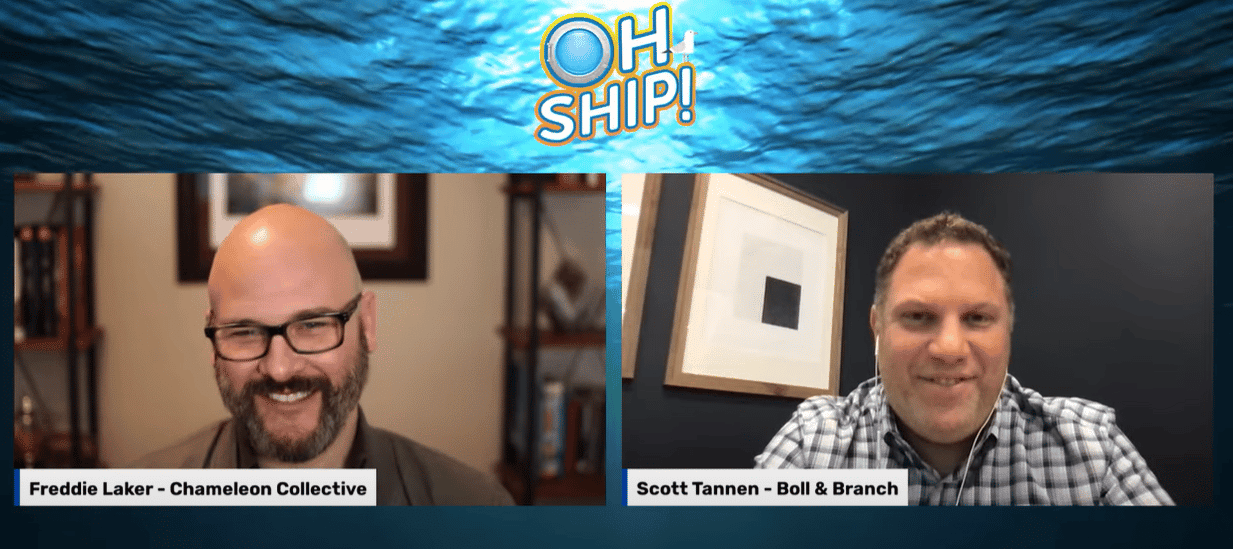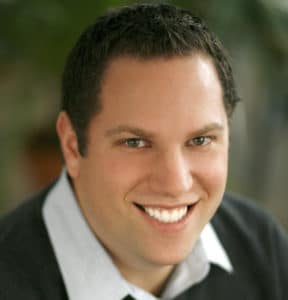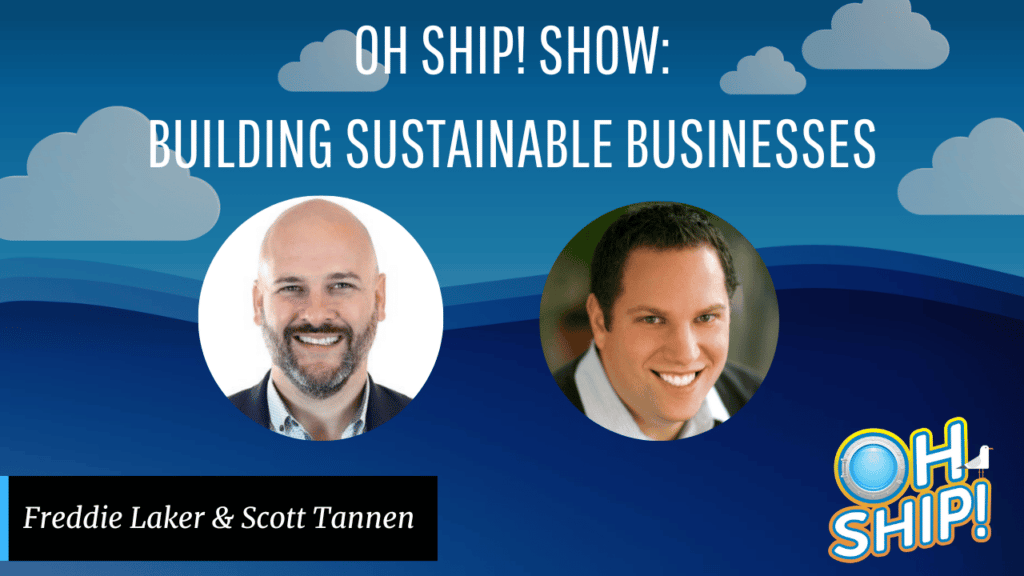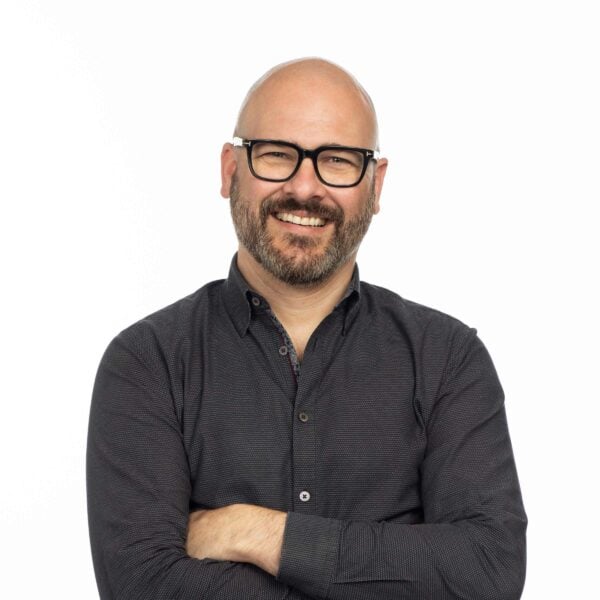Host, Freddie Laker, speaks with Scott Tannen about what it means to be a truly sustainable business

When we speak of building sustainable companies, many people jump to thoughts of earth-friendly products and practices. They’re piqued by natural ingredients, non-GMO cotton and food products, and non-synthetic, 100% recyclable materials. To be fair, this vision isn’t wrong, but it only paints part of the larger picture. A truly sustainable business is one that’s made to outlast its founder. It’s about building a business that’s bigger than its founder (or founders) and can continue its business growth even when the founder moves on.
To share more on the sustainable business model, Oh Ship! Show host Freddie Laker spoke with Boll & Branch founder and CEO Scott Tannen for expert first-hand insights.
Meet Scott Tannen

Scott Tannen is the CEO of Boll & Branch, a luxury goods business rooted in ethical, sustainably sourced materials. They’re the largest consumer of fair trade certified organic cotton in the world. Before launching Boll & Branch, Scott served as the Global Director of Interactive for Wrigley’s before moving on to start a company called Fun Tech. There he started Candy Stand, a gaming website that he later sold to Publisher’s Clearing House.
Boll & Branch is a true demonstration of Scott’s passion for building sustainable businesses—both in the literal sense of using eco-friendly materials and supporting 1000s of textile workers around the world with fair wages and business practices and in the sense of creating a company with a purpose bigger than his own.
Freddie: With a background in gaming, how did you bring a physical product-based company to life?
With such distinct parts of his career—CPGs, gaming and Fun Tech, and now Boll & Branch—Scott shares that his projects become a part of his identity. That part has taken some practice, though.
“So very few people know anything about where I came from and think how ridiculous it is that I would risk my entire family’s well-being on textiles. But the benefit of your first company is that you make a ton of mistakes. You get a few things right. And if you’re honest with yourself at some point, you can start to see those mistakes and start doing more of the right things and fewer of the dumb things.”
Scott loved the idea of building something so valuable that another company wanted to buy it. But once Scott had sold Fun Tech to Publisher’s Clearing House, he started thinking about the next best steps.
“When I was in gaming, I really missed the idea of a physical product. I loved the notion of working on Oreo cookies and then seeing that promotion on an end cap display when I walked through the grocery store. I started thinking, online gaming is just customer acquisition and it’s scaling penny profits into a business. So what if I could think about a similar model for physical goods, where the margins might not be quite as good as a technology product, but the total value of the dollars I’m playing with is significant? I knew people who were smarter than me, and I’m good at marketing and branding, soo I decided to create a private label brand and scale a business.”
Freddie: You say one of the keys to building sustainable businesses is transparency. Why does it matter and how are you bringing transparency to your company?
Scott’s idea of sustainable textiles started through his own search for bed sheets during a home remodel. He and his wife shopped around some of the biggest department stores to compare prices, thread counts, and materials, and the entire process felt exhausting.
“I didn’t know what made $400 sheets so special. I wanted to go home and Google it and make a quick decision so I could get back to my Playstation. To my surprise, I found that thread count had nothing to do with the quality of the sheet. And yet that’s what people care about when choosing sheets!
Feeling like the entire bed sheet category is built on a myth, Scott aimed to bring transparency to his brand.
“It occurred to me that bed sheets is a very well-known category, and yet there is no real leading brand. And as I dug deeper, I realized there wasn’t much sustainability in this category, either. People didn’t really know where their products were coming from (more on that in a moment). So I told my wife I wanted to start a bed sheets company, and she lovingly agreed as a way to get me off the couch that day. But I actually ran with it and wanted to really own it. Being transparent about a product that has lacked transparency for so long felt right. What’s amazing is you start asking some stupidly obvious questions that defy the status quo and lead you where you need to go.”
Freddie: How do you differentiate your business from the common practices of greenwashing and misinformation?
Going back to the purpose of sustainability, Scott discovered that transparency truly is key in differentiating a real sustainable company from one that only wants to be seen that way.
“I was trying to learn about this category. So I was pulled in by a company that said they used Egyptian cotton. I’m like, great, I’d love to go see the farms. They tell me they don’t have any relationship with the farm because they buy the cotton at the market. Then they tell me the textiles are made in Italy, but after a few phone calls, I found out they’re not. This manufacturer is selling some of the most high-end luxury bedding in the world and fixing a label that says Made in Italy. The products are actually made in China. And the cotton farm that’s growing Egyptian cotton is on the grounds of this factory in China, where the labor standards are horrific. To make a very long story short, they’re all BS. No one actually knew where any of this stuff came from. And trying to figure out a better way to bring transparency into this industry is truly what sets my vision apart.”
Hear the full conversation on the Oh Ship! Show.





